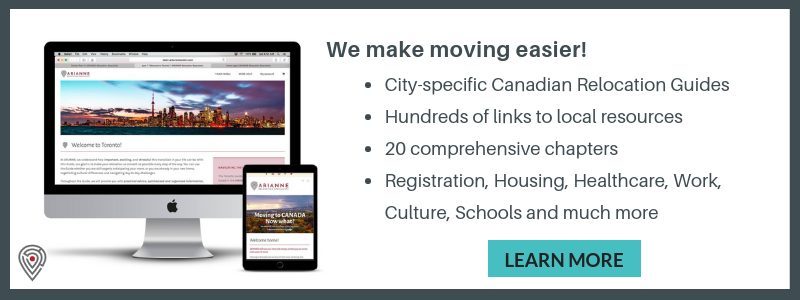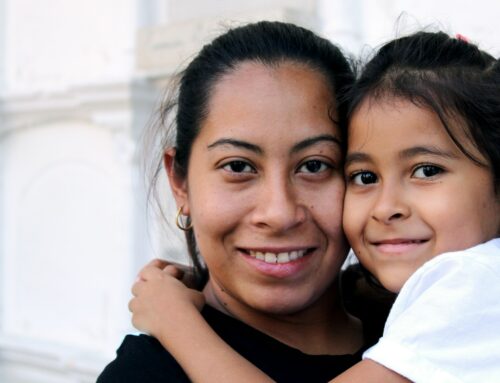So you’re thinking about moving to Canada. That sounds like a great idea. But what are the steps to Canadian immigration? How do you get started?
Naturally, you’ll probably start by doing a little research online. You’ll discover voluminous pages of government programs and federal guidelines. You’ll come across all manner of advice about what jobs are in demand, how to enroll in national healthcare, and how to ship your personal belongings overseas. But where do you begin?
Here’s a helpful overview of the process to help get you started. To make it as easy as possible, we’ve outlined five steps to Canadian immigration to give you a complete overview of the entire relocation process. And in fact, immigration is just one aspect of moving to a new country and making it your home.
The Canadian immigration and relocation process
1. Immigration procedures
First of all, and absolutely the most important, you’ll need to decide how you plan to immigrate. Will you go to Canada as a student, as a temporary skilled worker, as the grandparent of a Canadian resident? This is going to be the most important step in your move to Canada.
Luckily, the Canadian government offers a wide variety of visa programs, for skilled workers, for temporary workers, for students, for tourists, and for relatives. For most people moving to Canada, it’s already very clear which visa best suits their situation. But if you’re just trying to get to Canada anyway you can, then you’ll need to figure that out.
We’ve covered these options in a series articles on Canadian Immigration Programs, Finding an Immigration Consultant, Moving to Canada as an American, Moving to Canada as a Skilled Worker or Entrepreneur, Moving to Canada as a Freelancer, and Moving to Canada for Retirement.
Know your immigration options
The important thing to understand is that there are distinct programs for just about every type of immigrant, so you should be able to find a program that’s right for you. Students, skilled workers and transferees will usually receive assistance from their employer or their university, but in many cases, an individual will have to file all the paper work on their own.
If you’re fairly savvy with official paperwork and red tape, you should find the Canadian process pretty straightforward. It’s not the bureaucratic nightmare you might encounter in other lands. But if you have a big family, or an unusual case, or you just prefer not be troubled with the paperwork, then we recommend hiring an immigration consultant. In this case, it is essential to find a Regulated Canadian Immigration Consultant (RCIC), licensed by the Immigration Consultants of Canada Regulatory Council (ICCRC). Visit their website to find an immigration professional.
You can also visit the CIC for a complete list of Canada’s current immigration programs, or view one of our Online Relocation Guides for all the details.
2. Select your destination
In many cases—if you are moving to Canada for a specific job or enrolling at a particular university—you will know which city you are moving to. Then you can continue reading and researching about the various offerings and neighbourhoods. Again, our Online Relocation Guides are ideal for that, filled with both cultural and administrative information that will help you navigate your new city.
On the other hand, if you don’t know or haven’t decided which city you’re moving to, you’ll need to do some thinking, and then conduct some research. What are you looking for in Canada? Where is the best skiing, or fishing, or spelunking? Where are the best museums, or restaurants, or music festivals? What are the predominant industries of each city or region? Decide what’s important to you, and then zero in on it.
The following synopsis will give you a quick introduction to Canada’s major cities, but for a complete overview, check our article on Where to Live When Moving to Canada.
Know your Canadian cities
Based on factors like economic opportunity and quality of life, Montreal and Toronto are the two most popular destinations in Canada. Toronto is the fourth most populous city in North America and has some of the most expensive real estate on the continent, so if you’re not a big city person, or you’re on a limited budget, Toronto might not be your best choice. On the other hand, if you’re hoping to land a job in the media, technology or finance sector, Toronto is a booming hub for those industries. Montreal is a smaller and far more affordable city, but the winters can be especially harsh. You’ll also need to speak French, as that’s the official language of the Quebec Province. Montreal does have a wonderfully Europe feel to it though.
If you prefer the milder climate and more laid back lifestyle of the west coast, Vancouver is a spectacular city. And for those reasons it’s also one of the most expensive metropolitan areas in the world. Like Toronto, Vancouver is a very desirable location, with a booming economy and tremendous ethnic diversity. And as with any Canadian city, you can always find more affordable housing as you move further away from the metro center.
Although the majority of new arrivals land in Toronto, with Montreal and Vancouver a distant second and third, Canada is an enormous country. (Only Russia is larger.) If you’re in the oil and energy industry, you’ll most likely head to Edmonton or Calgary, in the Province of Alberta. If you prefer the small town feel but also need the stimulation of an educated and cultured population, then Canada’s capital city, Ottawa, might be your best choice.
Or maybe you’re just looking for the best fishing and moose watching, and want to live in a cabin in the woods. There’s plenty of space in Canada to get away from it all. Although you can usually feel pretty remote without being more than an hour or so from the city. And while polar bear viewing on Hudson Bay can be quite captivating, most people prefer to have reasonable access to hospitals, airports and other city services.
3. Get your documents and registration
When you arrive in Canada, there are a few administrative details that you will wish to take care of right away. These are fairly straightforward items, but each will involve a bit of time and legwork, dealing with local agencies or institutions, and presenting the required documentation.
- Social Insurance Number (issued by Canada)
- Health Card (varies by province)
- Driver’s License (issued by province)
- Open a bank account (decide which bank is best for you)
The Social Insurance Number (SIN) is essential if you want to work in Canada, pay taxes and receive public benefits. Usually, you’ll also need a SIN to get a bank account, a credit card or a mobile phone. You can obtain a SIN from any Service Canada office throughout the country. You must apply in person and you should do so immediately upon arrival, on your first or second day in the country. There is no application fee, but you will need proof of identity and proof of your Canadian residence status. You can find complete details and locate the nearest office on the Service Canada website.
For a better understanding of how to obtain these items, our Online Relocation Guides have detailed information specific to each city and province.
4. Cover your basic needs
You’ve finally jumped through the bureaucratic hoops, and satisfied all the legal and official requirements that come with being a resident of Canada. Now you can get serious about taking care of yourself and your family. When you first arrive, you’ll probably have to find some temporary housing arrangement, maybe a hotel, an AirBnB, or a short-term rental. But once you get yourself licensed and registered, you can comfortably enter a long term rental agreement, or maybe even purchase a home. From there, you’ll have to connect your utilities and buy some furniture, and then you will really begin to feel at home. This might be the time to purchase a car as well.
If you’ve got children, you’ll want to find school(s) for them. This alone might involve a great deal of research, and might be something to do even before you commit to renting or buying a house. You may also need to look into daycare options, babysitters, and pediatricians.
Eventually you’ll need to give some thought to just about every aspect of life, and how it differs in Canada from what you’re used to.
Making yourself at home
- HOUSING: Of course you need to find a place to live. That means understanding the pros and cons of buying versus renting, getting to know the different neighbourhoods. Also finding a good real estate agent, understanding property rights (or renters rights), and then setting up your utilities.
- DRIVING: If you want to drive in Canada, you need to get a Canadian driver’s license. Then you have to buy a car. Or maybe you want to lease one. A new car or a used car? Where to buy one, how to avoid getting taken advantage of, and then you need to shop for auto insurance. The questions go on and on.
- HEALTHCARE: Maybe you’ve heard that Canada has a great healthcare system. But who’s eligible? How do you enroll? What does it cover? And what doesn’t it cover?
- WORK: In most cases, living in Canada also means working in Canada. You’ll need to figure out what you need to do to in order to work legally. And how to find a job. And then there’s the subject of income taxes.
- SCHOOL: Are you planning to study in Canada, or do you have kids who are of school age? You’ll need to familiarize yourself with the education system and understand your options, for example, public schools vs. private schools vs. international schools. College or university? What can you study, how much will it cost?
- SHOPPING: If you’re just arriving in Canada, you may have very little with you besides a few suitcases. Whether you’re looking for the best quality or the lowest prices, you’ll quickly need to figure out the best places to buy things like furniture, clothing, hardware supplies, gifts, groceries, and on and on.
- CULTURE: If you’re coming to Canada from a place like India or Pakistan, you may be in for a taste of culture shock when you come to Canada. But even if you’re moving from a country like the U.S. or the U.K., you’ll be surprised to discover how many things are done differently in Canada, even if only slightly differently. Canadians have a different style of speaking and communicating, they have different customs around eating and drinking, different attitudes about race and gender, different attitudes on social and political issues, and so on. Be sure to read our article on Canadian Culture and Customs.
Again, ARIANNE’s Online Relocation Guides cover all the topics and more, for each of Canada’s major cities, and in minute detail. And if you need more personal assistance, we also offer one-on-one consultations.
5. Get comfortable
If it seems like the relocation process nearly goes on forever, then you’re beginning to get the idea. Making a fresh start in a new city or country can get pretty convoluted.
But at this point, you are nearly there. You are legal to work, live, drive and get medical care; you’ve found a pleasant home for yourself and your family; and now you can really settle in. It’s time to start getting to know your community and making some new friends. Get out and look for social opportunities, art exhibits, yoga classes, find your new favorite shops and restaurants, and get the most out of your new life in Canada!
Additional considerations
Although this quick list of 5 steps to Canadian relocation covers all the fundamentals, it is important to remember that every relocation is unique. One step that’s easy for you might be the most difficult for someone else, and vice versa. And while some people will have the time, patience and experience to navigate the transition on their own, others might find the process too difficult and cumbersome. And no matter how much you think you know about Canada or international relocation, it always helps to have a local expert on your side.
Relocation Services
For many years, multinational corporations and human resources departments have been relying on Relocation Service Specialists like ARIANNE to help ease the transition of their staff members who move overseas on international assignments. In fact, we have been providing this service to families and corporations for more than two decades. But many individuals who come to Canada independently are not aware of this service.
One of our chief goals at ARIANNE has always been to make Relocation Services available to everyone. We don’t believe that it should be an exclusive service available only to executives and VIPs. That’s why we launched our series of Online Relocation Guides in 2018. Yes, we continue to offer our traditional one-on-one and in person destination services for those who prefer to have everything arranged for them. But our Relocation Guides provide our clients with the knowledge and power to do it themselves.
Online Relocation Guides
Our massive Guides are both comprehensive and easy to use. City-specific, filled with local information for each major city in Canada, the guides cover 20 chapters of critical information. We take a close look at all the topics mentioned above, and much more, in exhaustive detail. Instead of spending hours scouring the internet and going through website after website of outdated and often contradictory information, our guides deliver easy, up-to-date answers. Hundreds of links will direct you to websites for local businesses and government agencies when necessary, for forms and applications.
Eventually, you’ll get to know your new city. But without a thorough guide, it could take months or years. We address the most important and pressing questions. And we provide solutions to other issues even before you’ve thought of the questions. In other words, we make the relocation easy. So you can spend your time coasting through your new city and exploring it in leisure, rather than simply treading water.
We often use this nautical metaphor to clarify the process for our clients. Moving from one country to another is like crossing a stormy sea. You could choose to paddle yourself unaided, and eventually you’ll probably make it to the other side. At times the water will be still and the sailing will be smooth. But when the storm kicks up, the risk of capsizing can be great. Our Guides spell out the best course, to help you avoid the maelstroms and the sea monsters. With proper guidance, you and your family will reach the other side quickly and safely, without getting soaked.
Premium Services
For those who want a higher level of Relocation Service, our one-on-one Tele-Consultations and In-Person Services are also very popular. With your membership and one-year subscription to the Guide, you can go online at any time and schedule a Tele-Consultation, usually conducted over Skype, for $99CAN an hour. In these consultations, one of our specialists (usually Manon, our founder) can talk you through some of the more specific issues and needs concerning your relocation experience.
With our In-Person Service, a real Canadian relocation specialist will accompany you through your new city. You can customize a package for a certain number of days, focusing on whatever areas you seek assistance with. Whether you want help finding a rental or shopping for a house, setting up your utilities in your new home, registering with local government agencies, getting to know local school districts, you can do it all with a knowledgeable local at your side.
Psychological stages of relocation
One final aspect of moving overseas that people fail to consider, is the psychological impact. Again, the process is different for everyone, but there is a general pattern of ups and downs that most transferees and expats go through.
Initially, excitement is the prevailing emotion. The idea of moving to another country fills you with visions of adventure, romance and exotic lands. That feeling may continue and even soar higher when you arrive in the new country. But at some point a sense of reality sets in, as you are confronted by cultural and logistical obstacles. Getting settled in a new house and within a new community can be a daunting task when you don’t know the ropes.
Many expats also go through a period of loneliness, missing their friends and family from back home. This can be especially difficult for the spouse of a transferee. When one partner moves to a new office in a foreign country, s/he still has a sense of security that comes from the stable work environment and company culture. But the spouse may be home alone in a strange country without the social support group they are accustomed to.
Children will also face a unique set of challenges, going to a new school and making new friends. In some cases the children, who tend to be more adaptable, will have an easier time adjusting than their parents. Again, a lot of it comes down to individual personalities. In any case, it’s critically important to speak openly about the relocation process, and make sure everyone is feeling OK and getting the support they need.
As time goes by, the new country begins to feel more and more comfortable, more and more like home. And once you’re settled in you new life, it all just feels like the new normal. Now you can continue to discover more of the surrounding areas, take a side trip to Niagara Falls or head up to Wapusk National Park.
The process of settling in a new country can be incredible. When you begin to take on a new nationality, without losing your old identity, you can truly grow as an individual and as a citizen of the world.
Feel free to contact ARIANNE at any time if you have any additional questions about our relocation products and services. Making your relocation run smoothly and successfully is always our top priority.
You can also check out our YouTube video for a quick introduction to relocation services.
PHOTO CREDIT: Pina Messina on Unsplash









Leave A Comment